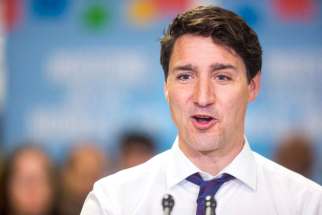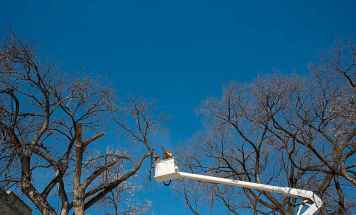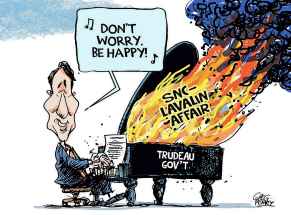Trudeau considers sending canola delegation to China
Read this article for free:
or
Already have an account? Log in here »
To continue reading, please subscribe:
Monthly Digital Subscription
$0 for the first 4 weeks*
- Enjoy unlimited reading on winnipegfreepress.com
- Read the E-Edition, our digital replica newspaper
- Access News Break, our award-winning app
- Play interactive puzzles
*No charge for 4 weeks then price increases to the regular rate of $19.00 plus GST every four weeks. Offer available to new and qualified returning subscribers only. Cancel any time.
Monthly Digital Subscription
$4.75/week*
- Enjoy unlimited reading on winnipegfreepress.com
- Read the E-Edition, our digital replica newspaper
- Access News Break, our award-winning app
- Play interactive puzzles
*Billed as $19 plus GST every four weeks. Cancel any time.
To continue reading, please subscribe:
Add Free Press access to your Brandon Sun subscription for only an additional
$1 for the first 4 weeks*
*Your next subscription payment will increase by $1.00 and you will be charged $16.99 plus GST for four weeks. After four weeks, your payment will increase to $23.99 plus GST every four weeks.
Read unlimited articles for free today:
or
Already have an account? Log in here »
Hey there, time traveller!
This article was published 26/03/2019 (2449 days ago), so information in it may no longer be current.
Prime Minister Justin Trudeau says the federal government is taking its canola spat with China “very seriously,” and is considering dispatching a delegation of diplomats in hopes of quelling an ongoing dispute over one of Western Canada’s main exports.
Last week, the Canola Council of Canada said it appeared China was ready to block all canola seed imports from Canada, an action widely viewed as retaliation for Ottawa’s arrest last fall of Huawei Technologies Co. Ltd. executive Meng Wanzhou at the request of United States tax authorities.
China blocks canola seed from Viterra
China has blocked imports of canola seed from a second major Canadian exporter.
China’s general administration of customs announced Tuesday on its website that its officials have detected several hazardous organisms in shipments of canola from Viterra Inc.
Shipments from Viterra have been blocked to prevent the introduction of pests to China, it said.
China has blocked imports of canola seed from a second major Canadian exporter.
China’s general administration of customs announced Tuesday on its website that its officials have detected several hazardous organisms in shipments of canola from Viterra Inc.
Shipments from Viterra have been blocked to prevent the introduction of pests to China, it said.
Viterra did not immediately respond to a request for comment.
The Chinese government gave the same reason for blocking canola shipped by Richardson International Ltd. of Winnipeg.
The Canola Council of Canada has reported that Chinese companies have stopped buying canola seed from Canadian producers.
China accounts for about 40 per cent of Canada’s exports of canola seed, oil and meal.
— The Canadian Press
Regina-based Viterra Inc., a subsidiary of Glencore Agriculture, was the latest producer to fall victim to China’s apparent canola ban Tuesday.
China’s general administration of customs announced on its website officials had detected several hazardous organisms in Viterra’s shipments of canola.
The move came three weeks after China suspended Winnipeg-based Richardson International’s export permit, citing “dangerous pests” in its canola shipments as well.
China accounts for about 40 per cent of Canada’s exports of canola seed, oil and meal.
“Obviously, we have seen a certain amount of challenges in our relationship with China over some diplomatic issues and, indeed, the rule of law, which we always stand up for. We stand up for Canadians,” Trudeau told reporters gathered in Winnipeg, during a visit Tuesday to the Manitoba Institute of Trades and Technology.
“But we are taking very seriously this situation around canola as well.”
The prime minister spoke Monday with Jim Everson, president of the Canola Council of Canada, and discussed the situation Tuesday with officials from Richardson International, including chief executive officer Hartley Richardson.
Richardson wouldn’t comment on the meeting, nor would the prime minister answer reporters’ questions about the rendezvous.
Trudeau tweeted, however, it was a “good meeting” with International Trade Diversification Minister Jim Carr and Richardson, where they talked about “what we’re doing to support Canadian canola.”
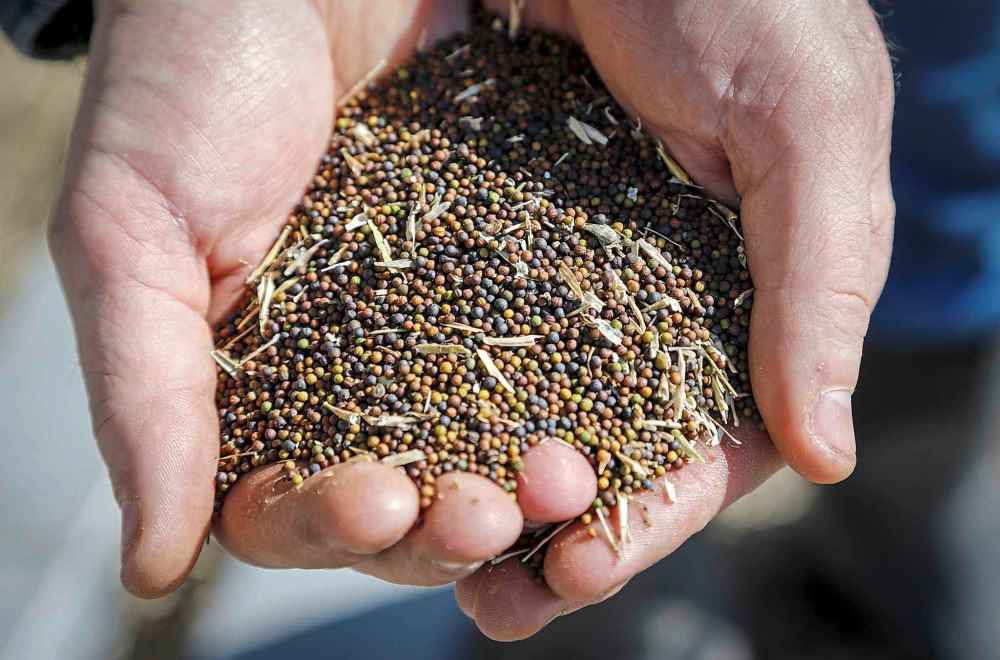
“We will always stand up for Canadian industries and workers,” the prime minister tweeted.
Trudeau also discussed the possibility of sending a delegation to China, something Manitoba Agriculture Minister Ralph Eichler also suggested Monday.
“There is significant interest in sending a high-level delegation to China to talk about the extraordinary work that we do in terms of oversight inspection and the science around ensuring the safety of and the quality of everything Canadian that Canada exports,” the prime minister said.
Brian Innes, vice-president of the Canola Council of Canada, told the Free Press the association is “really perplexed” by China’s actions.
“We don’t understand how the quality of our canola can change between December and now. We don’t understand China’s concerns when every other country in the world is happy with our canola,” Innes said.
“We need our technical officials to resolve it as quickly as possible,” he added, noting the council supports Trudeau sending delegates abroad.
Chuck Fossay, president of the Manitoba Canola Growers Association, said the trade talks aren’t yet influencing the growing intentions of producers.
In talking with his neighbours near Starbuck, and with other Manitoba farmers and seed dealers, Fossay said no one is avoiding growing canola or cutting back on acreage.
Farmers have to continually rotate crops between cereals and oilseeds or else weeds will build up resistance to specific herbicides.
“There aren’t many crops farmers (who) want to replace their canola… because it’s still our best-paying crop,” Fossay said in an interview.
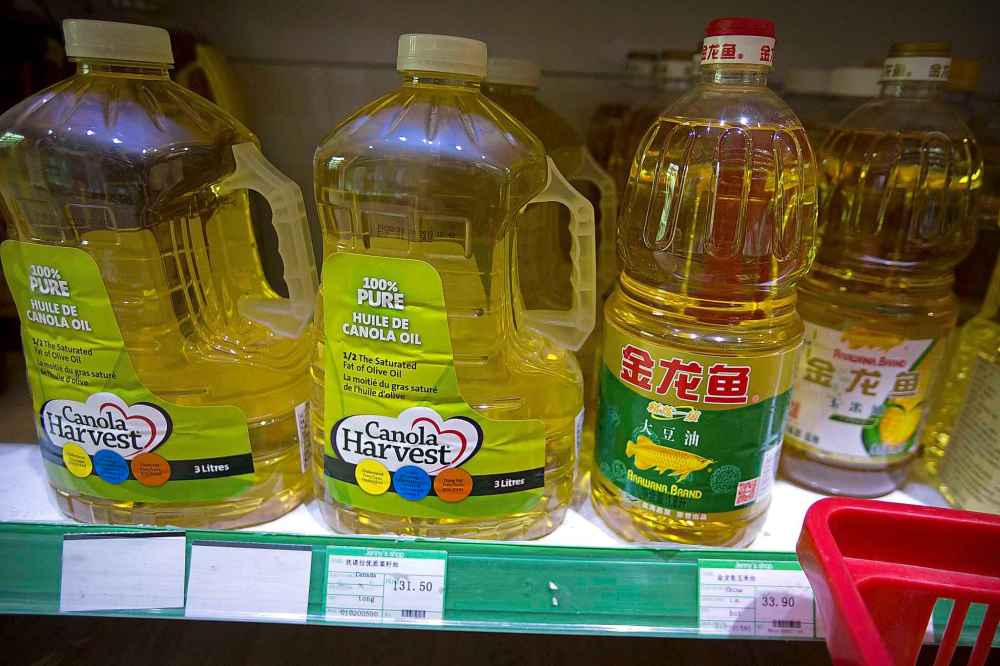
That’s despite a $20 per tonne (or 50-cent per bushel) drop in prices over the past few weeks since China started blocking Canada’s shipments.
The canola price is now just under $10 a bushel, Fossay said, noting a 50-cent fluctuation is “not unusual” and won’t cause widespread panic.
He also noted China is still purchasing canola oil and canola meal.
Because Manitoba has several canola crushers either in the province or in nearby North Dakota and Saskatchewan, virtually no raw seed from the province goes to China. Manitoba canola should not get backed up because of China’s actions, Fossay said.
— with files from The Canadian Press
jessica.botelho@freepress.mb.ca
bill.redekop@freepress.mb.ca
Trudeau meets with local labour leaders
After visits with students at the Manitoba Institute of Trades and Technology and with canola heavyweights at Richardson International, Prime Minister Justin Trudeau met with local labour leaders and union delegates in Winnipeg Tuesday.
Trudeau received a standing ovation upon his arrival, then delivered an eight-minute-long, campaign-style speech to about 100 people gathered at the Union Centre on Broadway over lunchtime.
Kevin Rebeck, president of the Manitoba Federation of Labour, said it was the first time a prime minister visited the Union Centre, which may have explained the hearty applause. He noted the Prime Minister’s Office requested the meeting with local labour officials and they accepted the invitation, despite past conflicts.
Rebeck maintained the labour event was “not an endorsement” for Trudeau.
“We are very disappointed at the failed Phoenix payroll system. That was one of the first topics we brought up with him, as well as how we saw collective bargaining being managed through the federal government with Canada Post and CUPW (Canadian Union of Postal Workers),” he said.
“I think raising (issues) directly with the prime minister was a good opportunity and something I would do anytime I meet with government,” Rebeck said, noting he had already heard some criticism about posing for pictures with Trudeau.
“This wasn’t about supporting a candidate or a government or a party. This was about dealing face to face with the national leader of our country and being able to raise labour’s issues. So no, this isn’t an endorsement.”
— Jessica Botelho-Urbanski
History
Updated on Tuesday, March 26, 2019 10:47 AM CDT: corrects Eichler's name
Updated on Tuesday, March 26, 2019 11:07 AM CDT: Adds video
Updated on Tuesday, March 26, 2019 6:22 PM CDT: Full write through.
Updated on Tuesday, March 26, 2019 6:50 PM CDT: Adds photos.
Updated on Wednesday, March 27, 2019 9:58 AM CDT: Added Bill Redekop to byline.







